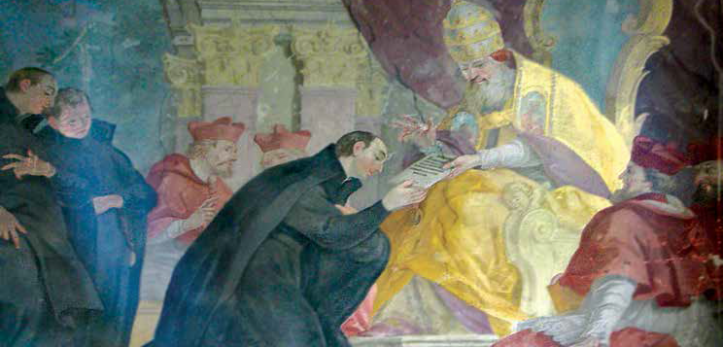The Confessional State (Part 3)
Author: Grzegorz Kucharczyk,
"Love One Another!" 39/2017
Catholic Church

Read also: Part 1
Read also: Part 2
It can be claimed that since the French Revolution, which not only fought against the Church and the Christian vision of the State but also established a new “secular religion”, we have witnessed the return of the ancient Byzantium in Europe.

The Liberals’ problem with liberty
Centuries ago, Byzantine emperors considered themselves “external bishops” and believed they had the right to establish a complete domination of the secular power over the Church. After the French Revolution, the role of new “Byzantine emperors” was skillfully assumed by Western European Liberals. It was at their bidding that, beginning with the second half of the 19th century, Europe was shaken – from Prussia to Portugal – by “culture wars” (Kulturkämpfe), which de facto were efforts at secularization imposed from the top. They were not produced by any “objective zeitgeist” or “challenges of new times”, but rather by specific governments drafting concrete anti- Church laws subsequently passed by very concrete (Liberal-dominated) parliament majorities.
The nineteenth-century Liberals (like their contemporary counterparts) were not at all after liberty. Had they been, it would mean in practice the necessity to come to terms with the liberty of Catholic parents to educate their children in schools operated by religious orders so muchloathed by Liberals. It would mean the necessity to respect the liberty of a Catholic citizen who “fancies” joining the Society of Jesus – an order that in all countries going through the successive stages of “culture wars” suffered the worst repressions, including total banishment. Finally, it would mean the necessity to recognize Catholics’ liberty to dispose of their property through wills. However, liberals everywhere could not bring themselves to recognize this liberty as they formed laws that were aimed at the confiscation of Church property (obtained by and large through such testamentary bequests and gifts).
It was not liberty that the liberal authors of nineteenth-century kulturkämpfe were after, but progress peculiarly understood. In the first place, it was taken to mean a complete expulsion of the sacred from the public sphere, which was broadly understood to include the spheres of education, politics, and work spaces. The instrument that served that purpose, which thus assumed a new form of “secular religion”, was the State as perceived by the liberal promoters of the kulturkämpfe. Naturally, if the State was to fulfill this purpose, it had to be governed by the “right” people, i.e. liberals of various shades, who had at their disposal overt (the press) and covert (freemasonry) means of supporting their policies.
The modern version of the confessional state
Such a State was to be unrelenting in bringing about “progress” with the help of emergency legislation, the police and, when necessary, the army. In practice, however, it was about, let us declare it unequivocally, introducing a new version of a “secular religion” or militant secularism. In this context, it can be said that various European kulturkämpfe were not only about the fight against the Catholic Church. The removal of Catholic influences from the public sphere (beginning with education) was meant as a specific preparation of the grounds for the principal goal – the establishment of a confessional State which would mercilessly persecute those who were identified as enemies of “progress”.
Such an enemy – and the most formidable too – in the eyes of liberal promoters of “culture wars” was the Catholic Church, which had developed a Christian vision of State- Church relations in the course of a century-long struggle against the usurpations of secular power. The vision respected the autonomy of both powers but did not treat the secular sphere as by definition inaccessible to the Almighty God, acting in the world through his Church.
In this context, the words of Heinrich Bassermann, a liberal Evangelical theologian from Heildelberg University and an uncritical supporter of Bismarck’s kulturkampf, are worth quoting. In 1874, he said: “We, Protestants, perceive the State differently than eleventh-century popes. For us, the State is not only a place populated by godless and power-greedy people. For us, it is in itself a moral and divine order. And even the highest moral order that has ever existed on earth. It is for this reason that the State must bring under its control any other community, like links in a chain. […] For the State encompasses the plenitude of moral and spiritual goods, beatitudes and obligations and, therefore, carries with itself a divine idea, likewise the [evangelical] Church which mediates in giving religious goods and beatitudes, satisfies religious needs and imposes religious duties.”
After removing clergymen from state schools, secularists undertook to deprive Catholic parents of the possibility to educate their children in Church-operated schools
With these words a liberal supporter of kulturkampf described what is commonly known as statolatry or worshipping of the State and what was to become the overriding principle of public life in the German Reich upon the enforcement of Kulturkampf legislation. However, the same ideas were implemented everywhere, where under the pretext of a struggle for a “better, more modern culture”, the Church was attacked not only in its hierarchy but in the body of its believers who in the name of fundamental freedoms opposed the adherents of militant secularity.
The Church against a new idol
The one who stood against these policies most courageously was the pope, Bl. Pius IX (1846-1878). In the famous Syllabus (attached to the encyclical Quanta cura published in 1864) the pope included among numerous errors rejected by the Church, the statement “The Roman pontiff may and should reconcile and come to terms with progress, liberalism and modern civilization.”
Not only were priests and religious removed from schools but also new curricula, promoting the so-called secular worldview (a new name for the “secular religion”), were designed
This beggars belief. The Church is to turn its back on modern civilization? Contrary to what the propaganda of the promoters of “culture wars” hammered, this position of Pius IX did not testify to the Church’s bizarre lack of confidence in modern times and man’s liberation aspirations. Quite the contrary. For the pope rejected the connotations given to “progress” and “modernity” by Liberals at that time, specifically the program of separating Catholicism from society and forcing statolatry at the same time.
However, the true cause of the violent attack by Liberals on the Syllabus errorum drafted by the blessed pope was another ruling by Pius IX that struck at the very heart of the new “secular religion”. For among the errors condemned by the pope, there was a thesis that “the State, being the origin and font of all laws, has unlimited powers.” In other words, the pope condemned the cult of a new idol, that is, the “modern” State. It is this idol that was worshipped by the authors of successive “culture wars” who wanted to force people believing in God to do the same.
Unleashed in the Reich by Bismarck and German liberals supporting him (with a majority in the parliament), the Kulturkampf, which reached its zenith in the 1870s, was in this respect a model attempt to establish the domination of secular power over the spiritual in the name of the “modern State”. Its first step was the removal of priests and religious from schools (1871-1872), while the last was a far-reaching interference in the seminary formation of the clergy. This was done by a statutory requirement, introduced in Prussia by virtue of the so-called May Laws of 1873-1874, that the education of future priests be supervised by the State and that priests take a so-called state examination. As always in such cases, many religious orders were expelled from the Reich. Considered the most dangerous, yet again, were the Jesuits who until 1917, by virtue of a special law (Jesuitengesetz), could not stay within the borders of the German state. The ban was applied even to those members of the Society of Jesus who were German citizens.
Similar measures were introduced by militant secularists in the French Third Republic after 1875. In 1876-1879, the school system was completely secularized by virtue of the so-called Ferry’s laws – so named after the name of the then French prime minister. Not only were priests and religious removed from schools but also new curricula, promoting the so-called secular worldview (a new name for the “secular religion”), were designed. All of a sudden, great French cathedrals, symbols of the country’s culture, disappeared from history and geography textbooks and were replaced by train engines, factories and, after 1889, the Eiffel Tower.
After removing clergymen from state schools, secularists undertook to deprive Catholic parents of the possibility to educate their children in Church-operated schools, mostly those run by religious orders. Thus, beginning with the last quarter of the 19th century, Catholic religious orders (even contemplative ones like Carthusians or Carmelites) were driven away from France. Next, in the early 20th century, schools run by the orders which had survived in France were closed down.
Each time, expelled clergy were accompanied by crowds of believers, who on many an occasion actively tried to defend monasteries against the gendarmerie. The protesters would always cry: “Long live freedom!” However, there was less and less freedom for the Church and believers in a liberal confessional state.
All of a sudden, great French cathedrals, symbols of the country’s culture, disappeared from history and geography textbooks and were replaced by train engines, factories and, after 1889, the Eiffel Tower
The ever harsher repressions of believers, demanding respect for their fundamental civil freedoms, were justified by Émile Combes, the Prime Minister in 1902-1905. A freemason of the highest rank, who maintained that in freemasonry he had discovered his “spiritual homeland”, Combes explained in the French parliament – why a citizen who had taken religious vows could not realize his or her freedom as a teacher in a school operated by a religious order the citizen had joined – in the following words: “A person who out of free will separates from society and takes a vow not to have anything to do with it cannot be a teacher. […] Upon the disappearance of civic personality, the civic prerogatives disappear as well.”
“Prohibited act” at Fatima
In this way militant secularists returned to the slogan coined by their ideological forerunners, the French revolutionaries, proclaiming that “there is no freedom for the enemies of freedom” (Saint-Just). In the name of this slogan, France in the early 20th century saw the introduction of a nationwide surveillance of army officers to see how “clerical” they were. This meant, for instance, regular church attendance on Sundays or sending children to Catholic schools. Those who were found too “clerical” stood no chance of promotion. This is how the mechanism of the “index-card affair” worked (special index-cards were used to record the personal particulars of officers kept under surveillance) whose unmasking brought about a huge scandal in France and cost Combes his premiership.
In turn, in the early 20th century, the title of “Portuguese Combes” was given to Alfonso Costa, a liberal politician. After monarchy had been abolished in Portugal in the wake of the October 1910 revolution, Costa as prime minster relentlessly implemented the program of top-down secularization of Portugal. The program began with the decrucification (removal of crosses) of offices and schools; next, the army was purged of chaplains and religion ceased to be taught at schools. In 1911, a law was enacted, patterned on the French model, providing for the so-called separation of Church and State. By late 1911, there was not a single Catholic bishop left in Portugal. Since all of them had loudly protested against the attacks on the Church, they were punished by expulsion from the country.
Furthermore, Portuguese militant secularists laid down a ban on “ostentatious cults” in the 1911 law on the “Separation of Church and State.” The ban made it illegal not only to wear a cassock by priests but also to pray the rosary in public. In light of this law (or de facto a travesty of law), Our Lady, who a few years after the secular confessional state had been installed in Portugal, appeared to three children in Fatima, asking Francisco, Jacinta and Lucia to pray the rosary everyday wherever they were, actually abetted the commission of a prohibited act.
Source: https://loamagazine.org/archive/2017/2017-39/the-confessional-state-part-3
The article was published with the permission from "Love One Another!" in April 2021.
Submit
your article!
Read
more articles - Free!
Need
translation jobs? Click here!
Translation
agencies are welcome to register here - Free!
Freelance
translators are welcome to register here - Free!
Subscribe
to TranslationDirectory.com newsletter - Free!
Take
part in TranslationDirectory.com poll - your voice counts!
|





